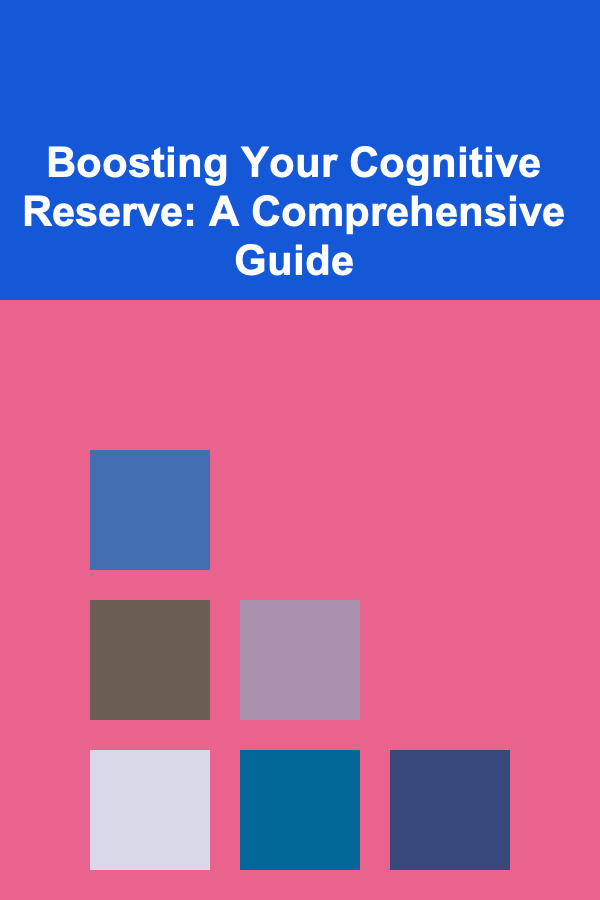
Boosting Your Cognitive Reserve: A Comprehensive Guide
ebook include PDF & Audio bundle (Micro Guide)
$12.99$8.99
Limited Time Offer! Order within the next:

Our brains are remarkably adaptable, capable of learning and growing throughout our lives. This adaptability, combined with the brain's inherent capacity to compensate for damage or age-related decline, is what we refer to as cognitive reserve. Think of it as a buffer, a resilience against the effects of aging, injury, or disease. A higher cognitive reserve allows you to maintain cognitive function for longer, even in the face of neurological challenges.
While we can't definitively measure cognitive reserve directly (there isn't a single test), we can build it. This article delves deep into the science behind cognitive reserve and provides actionable strategies to enhance this crucial aspect of brain health. It's not about intelligence; it's about the brain's ability to adapt and utilize its resources effectively. Everyone, regardless of their background or current cognitive function, can benefit from boosting their cognitive reserve.
Understanding Cognitive Reserve
Cognitive reserve isn't simply about having a larger brain or more neurons. Instead, it's about the efficiency and flexibility of neural networks. Individuals with higher cognitive reserve can recruit alternative brain pathways and strategies to perform tasks, even when primary pathways are compromised. This compensation mechanism allows them to maintain a higher level of cognitive performance despite underlying brain pathology.
Several factors contribute to cognitive reserve, including:
- Education: Formal education provides a foundation of knowledge and skills, but more importantly, it fosters critical thinking, problem-solving, and lifelong learning habits.
- Occupation: Complex and stimulating occupations that require decision-making, analysis, and social interaction contribute significantly to cognitive reserve.
- Lifestyle: A healthy lifestyle, including regular physical activity, a nutritious diet, and social engagement, plays a vital role in protecting and enhancing cognitive function.
- Cognitive Activities: Engaging in mentally stimulating activities like reading, puzzles, learning new skills, and playing strategic games challenges the brain and promotes neuroplasticity.
The concept of cognitive reserve explains why some individuals with significant brain pathology (e.g., Alzheimer's plaques) show minimal clinical symptoms, while others with similar levels of pathology experience severe cognitive decline. It highlights the importance of proactive brain health strategies throughout life.
The Neuroscience of Cognitive Reserve: How it Works
To truly understand how to boost cognitive reserve, we need to delve into the underlying neurobiological mechanisms. While research is ongoing, several key processes are believed to be involved:
1. Neuroplasticity: The Brain's Adaptability
Neuroplasticity is the brain's ability to reorganize itself by forming new neural connections throughout life. This dynamic process allows the brain to adapt to new experiences, learn new skills, and recover from injury. Activities that challenge the brain and require learning promote neuroplasticity, strengthening existing connections and creating new ones.
Specific examples of neuroplasticity include:
- Synaptogenesis: The formation of new synapses (connections between neurons). Learning a new language, playing a musical instrument, or mastering a new skill all stimulate synaptogenesis.
- Dendritic Arborization: The growth and branching of dendrites (the receiving ends of neurons). A richer dendritic arbor allows neurons to receive more input and communicate more effectively.
- Neurogenesis: The birth of new neurons. While neurogenesis is limited in the adult brain, it does occur in certain regions, particularly the hippocampus (involved in learning and memory). Exercise and enriched environments can promote neurogenesis.
2. Brain Network Efficiency
Cognitive reserve is not just about the number of connections, but also their efficiency. Individuals with higher cognitive reserve tend to have more efficient brain networks, meaning that information is processed more quickly and effectively. This efficiency can be achieved through:
- Pruning: The elimination of unnecessary or inefficient connections. While it might seem counterintuitive, pruning is essential for optimizing brain function. During development and throughout life, the brain selectively strengthens useful connections and eliminates weak ones.
- Myelination: The insulation of nerve fibers with myelin, a fatty substance that speeds up the transmission of nerve impulses. Myelination enhances the efficiency and speed of communication between different brain regions.
3. Cognitive Strategies and Compensation
Individuals with higher cognitive reserve often develop and utilize more effective cognitive strategies to solve problems and perform tasks. These strategies can include:
- Using external aids: Making lists, using calendars, and setting reminders to compensate for memory lapses.
- Breaking down complex tasks: Dividing a large task into smaller, more manageable steps.
- Using mnemonic devices: Employing memory techniques like acronyms and rhymes to improve recall.
- Focusing attention: Minimizing distractions and concentrating on the task at hand.
By learning and applying these strategies, individuals can effectively compensate for age-related or disease-related cognitive decline.
4. Brain Volume and Structure
While not the sole determinant, brain volume and structure do play a role in cognitive reserve. Maintaining healthy brain volume, particularly in regions crucial for cognitive function (e.g., hippocampus, prefrontal cortex), is important for preserving cognitive abilities. Factors that can contribute to brain atrophy include aging, chronic stress, and certain medical conditions. Promoting healthy lifestyle choices and engaging in cognitively stimulating activities can help to maintain brain volume and structural integrity.
Practical Strategies to Boost Cognitive Reserve
Now that we understand the science behind cognitive reserve, let's explore practical strategies you can implement to enhance this crucial aspect of brain health. These strategies encompass various aspects of life, from education and occupation to lifestyle and cognitive activities.
1. Lifelong Learning: Embrace the Challenge
Education is a cornerstone of cognitive reserve. Formal education provides a solid foundation, but the benefits extend far beyond the classroom. Lifelong learning, the continuous pursuit of knowledge and skills, is crucial for maintaining and enhancing cognitive function throughout life.
Here are some ways to incorporate lifelong learning into your routine:
- Take a course: Enroll in a class at a local college, community center, or online platform. Choose a subject that interests you, whether it's history, art, science, or a practical skill like coding or photography.
- Learn a new language: Language learning is an excellent brain exercise that challenges memory, attention, and problem-solving skills. Numerous apps and online resources make language learning accessible to everyone.
- Master a new skill: Pick up a new hobby, such as playing a musical instrument, learning to knit, or taking up woodworking. The process of acquiring a new skill stimulates neuroplasticity and strengthens neural connections.
- Read widely: Make reading a regular habit. Explore different genres, authors, and perspectives. Reading expands your knowledge, improves your vocabulary, and sharpens your critical thinking skills.
- Attend lectures and workshops: Seek out opportunities to learn from experts in various fields. Attending lectures and workshops exposes you to new ideas and perspectives, stimulating your curiosity and challenging your assumptions.
2. Engage in Mentally Stimulating Work
The type of work you do can have a significant impact on your cognitive reserve. Complex and stimulating occupations that require decision-making, problem-solving, and social interaction are particularly beneficial. If your current job is not intellectually challenging, consider ways to make it more stimulating or explore new career paths.
Here are some strategies to consider:
- Seek out challenges: Volunteer for new projects, take on responsibilities that stretch your abilities, and look for opportunities to solve problems creatively.
- Learn new skills: Identify skills that are in demand in your field or that would enhance your performance and actively seek to acquire them.
- Collaborate with others: Engage in teamwork and collaboration with colleagues. Working with others exposes you to different perspectives and challenges you to think critically.
- Seek out a mentor: Find a mentor who can provide guidance, support, and feedback to help you develop your skills and advance your career.
- Consider a career change: If your current job is chronically unstimulating and you have the opportunity to make a change, consider pursuing a career that aligns with your intellectual interests and challenges you to grow.
Even if you are retired, you can still engage in mentally stimulating work through volunteering, consulting, or pursuing a passion project.
3. Nourish Your Brain: Diet and Nutrition
What you eat directly impacts your brain health. A diet rich in nutrients that support brain function is crucial for maintaining cognitive reserve. Focus on incorporating the following into your diet:
- Omega-3 Fatty Acids: Found in fatty fish (salmon, tuna, mackerel), flaxseeds, and walnuts, omega-3 fatty acids are essential for brain health and cognitive function. They support cell membrane structure and reduce inflammation.
- Antioxidants: Found in fruits and vegetables, antioxidants protect brain cells from damage caused by free radicals. Berries, spinach, kale, and broccoli are excellent sources of antioxidants.
- B Vitamins: B vitamins, particularly B12, B6, and folate, are essential for nerve function and cognitive health. They are found in meat, poultry, fish, eggs, and leafy green vegetables.
- Mediterranean Diet: The Mediterranean diet, characterized by a high intake of fruits, vegetables, whole grains, olive oil, and fish, has been shown to be beneficial for brain health and cognitive function.
Limit your intake of processed foods, sugary drinks, and saturated and trans fats, as these can negatively impact brain health.
4. Get Moving: The Power of Exercise
Physical activity is not just good for your body; it's also excellent for your brain. Exercise improves blood flow to the brain, stimulates the release of neurotrophic factors (proteins that support brain cell growth and survival), and reduces inflammation. Aim for at least 30 minutes of moderate-intensity exercise most days of the week.
Here are some examples of brain-boosting exercises:
- Aerobic exercise: Activities like walking, running, swimming, and cycling increase heart rate and improve blood flow to the brain.
- Strength training: Lifting weights or using resistance bands helps to build muscle mass and improve cognitive function.
- Yoga and Tai Chi: These mind-body practices improve balance, flexibility, and cognitive function. They also reduce stress, which can negatively impact brain health.
- Dancing: Dancing combines physical activity with coordination and memory, making it an excellent brain exercise.
5. Socialize and Connect: The Importance of Social Engagement
Social interaction is crucial for cognitive health. Strong social connections provide intellectual stimulation, emotional support, and a sense of belonging. Make an effort to stay connected with friends and family, join social groups, and participate in community activities.
Here are some ways to increase your social engagement:
- Join a club or organization: Find a group that shares your interests, whether it's a book club, a hiking group, or a volunteer organization.
- Volunteer your time: Volunteering is a great way to give back to your community and connect with others.
- Attend social events: Make an effort to attend social gatherings, such as parties, concerts, and sporting events.
- Stay in touch with friends and family: Regularly call, email, or visit with friends and family members.
- Take a class: Enroll in a class or workshop to learn a new skill and meet new people.
6. Challenge Your Brain: Cognitive Training and Games
Engaging in mentally stimulating activities that challenge your brain can help to improve cognitive function and build cognitive reserve. These activities can include:
- Puzzles: Crossword puzzles, Sudoku, jigsaw puzzles, and other types of puzzles challenge your problem-solving skills and memory.
- Brain training games: There are numerous brain training apps and websites that offer a variety of games designed to improve cognitive skills such as memory, attention, and processing speed. Look for programs backed by scientific research.
- Strategic games: Playing chess, Go, or other strategic games requires critical thinking, planning, and problem-solving.
- Learning a new instrument: Playing a musical instrument is a complex activity that challenges multiple brain regions.
- Creative activities: Painting, drawing, writing, and other creative activities stimulate imagination and problem-solving skills.
The key is to choose activities that are challenging and enjoyable. Variety is also important, as engaging in a range of different activities will stimulate different brain regions.
7. Manage Stress: Protect Your Brain
Chronic stress can have a detrimental impact on brain health. Stress hormones like cortisol can damage brain cells and impair cognitive function. Learning to manage stress effectively is crucial for protecting your brain and building cognitive reserve.
Here are some stress-reduction techniques to consider:
- Mindfulness meditation: Mindfulness meditation involves focusing your attention on the present moment, without judgment. It can help to reduce stress, improve focus, and enhance cognitive function.
- Deep breathing exercises: Deep breathing exercises can help to calm the nervous system and reduce stress.
- Yoga and Tai Chi: These mind-body practices combine physical activity with relaxation and mindfulness, helping to reduce stress and improve overall well-being.
- Spending time in nature: Spending time in nature has been shown to reduce stress and improve mood.
- Getting enough sleep: Sleep deprivation can increase stress and impair cognitive function. Aim for 7-8 hours of sleep per night.
8. Prioritize Sleep: Essential for Brain Health
Sleep is essential for brain health and cognitive function. During sleep, the brain consolidates memories, clears out toxins, and repairs itself. Chronic sleep deprivation can impair cognitive function, increase stress, and increase the risk of neurodegenerative diseases.
Aim for 7-8 hours of quality sleep per night. Establish a regular sleep schedule, create a relaxing bedtime routine, and optimize your sleep environment to promote restful sleep.
9. Limit Alcohol Consumption and Avoid Smoking
Excessive alcohol consumption and smoking are both harmful to brain health. Alcohol can damage brain cells and impair cognitive function, while smoking reduces blood flow to the brain and increases the risk of stroke and other neurological disorders.
Limit your alcohol consumption to moderate levels (no more than one drink per day for women and two drinks per day for men) and avoid smoking altogether.
10. Monitor and Address Underlying Health Conditions
Certain underlying health conditions, such as high blood pressure, diabetes, and high cholesterol, can increase the risk of cognitive decline. Managing these conditions effectively is crucial for protecting your brain and building cognitive reserve.
Work with your doctor to monitor your health and address any underlying health conditions. Follow their recommendations for medication, diet, and lifestyle changes.
Conclusion: Investing in Your Cognitive Future
Boosting your cognitive reserve is not a quick fix but a lifelong journey. It's about making conscious choices every day to engage your brain, nourish your body, and connect with others. By incorporating the strategies outlined in this article into your routine, you can build a robust cognitive reserve that will protect your brain and allow you to thrive cognitively throughout your life.
Remember, even small changes can make a big difference. Start with one or two strategies that resonate with you and gradually incorporate more over time. The sooner you start, the greater the benefits you will reap. Your brain is a precious asset -- invest in its health and well-being, and it will serve you well for years to come.

How to Choose Between Short-Term vs. Long-Term Rentals
Read More
How to Manage Finances for a Growing Family
Read More
How to Organize Your Tech Gadgets for Easy Access
Read More
How to Set Up a Functional Outdoor Fitness Space
Read More
The Marketing Manager's Guide: Strategies for Driving Brand Success
Read More
How to Develop Your World-Building Details
Read MoreOther Products

How to Choose Between Short-Term vs. Long-Term Rentals
Read More
How to Manage Finances for a Growing Family
Read More
How to Organize Your Tech Gadgets for Easy Access
Read More
How to Set Up a Functional Outdoor Fitness Space
Read More
The Marketing Manager's Guide: Strategies for Driving Brand Success
Read More